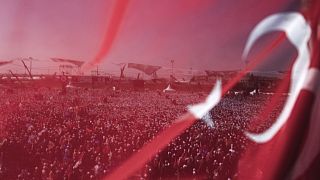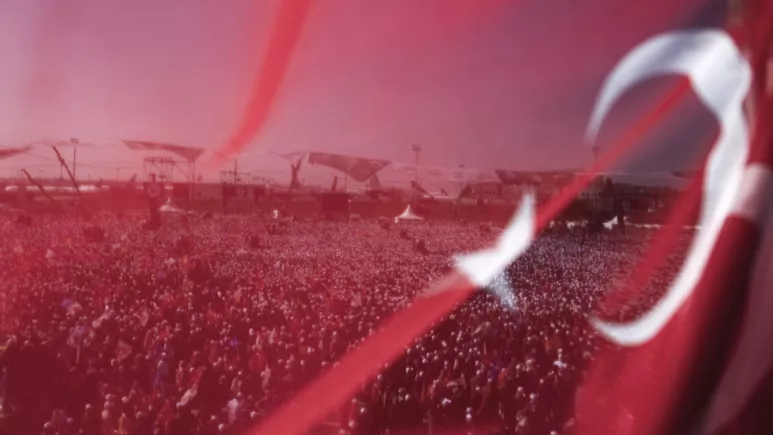The winners and losers of Erdogan’s Turkey

An election rally campaign in Istanbul, Turkey, Sunday, May 7, 2023. – Copyright Khalil Hamra/Copyright 2023 The AP. All rights reserved
Some parts of Turkish society have benefited under Erdogan’s decades long rule – others haven’t.
President Recep Tayyip Erdogan and his AKP Party have dominated Turkish politics for two decades.
ADVERTISEMENT
SCROLL TO CONTINUE WITH CONTENT
But this could be about to change, with Erdogan facing his toughest challenge yet in May 14 elections.
As Turks head to the ballot box, here are some sectors of society that have won – and lost – under his rule.
The winners
The Religious
Erdogan is popular among conservative and religious voters, having steered the country away from its secular foundations towards a more Islamist direction.
The Directorate of Religious Affairs (Diyanet) has become a powerful social force under Erdogan, himself a devout Muslim.
about:blank
The Diyanet has its own television channel, which influences political debate, and a budget comparable to that of a medium-sized ministry.
The scope of its powers has made Diyanet a target of the President’s secular opponents, who denounce the increase in the number of mosques, Quran classes and the influence of religious brotherhoods.
A former head of the Diyanet has been embroiled in a scandal over his lavish lifestyle.
Real estate and construction
Under Erdogan, real estate and construction have expanded throughout Turkey, stimulating infrastructural growth.
Some groups and contractors close to the government have been awarded lucrative government contracts.
They are “big funders” of his AKP party, Timothy Ash, an emerging markets expert at BlueBay Asset Management, told Euronews in December. He claimed interest rates had been kept artificially low to benefit this sector, fuelling economic calamity in Turkey.
This building frenzy has reshaped the country, providing new homes for millions of people while dramatically changing the skyline of cities like Istanbul.
It aligns with Erdogan’s appetite for “crazy projects” – ambitious multi-billion dollar mega-investments – including the Istanbul Canal, conceived as a way to make the country more attractive to tourists.
Conservative women
Erdogan has defended the rights of conservative Muslims after decades of a resolutely secular regime.
Pious women have been gradually allowed to wear headscarves in universities, the civil service, the police and parliament, where they were once de facto banned.
The Turkish President made it personal because his two daughters, covered like their mother, had “not been allowed to wear the headscarf” at university.
Still, more liberal and feminist women have complained of an increasingly hostile environment under Erdogan, accusing him of rolling back their rights and cracking down on female political groups.
Sparking outrage, Erdogan withdrew the country in 2021 from the Istanbul Convention, a landmark treaty on preventing violence against women and domestic violence.
Turkey is the first – and only – country to have pulled out of it.
The losers
The media
The Turkish media landscape, once held up as an example of pluralism, has become increasingly more restricted under Erdogan.
Observers estimate that 90 per cent of the Turkish media are now controlled by the government or its supporters.
The president has encouraged the acquisition of newspapers and television stations by businessmen close to the government, who have been granted public loans.
At the same time, a crackdown on critical voices began, which was further strengthened after the failed coup of 2016. According to the Turkish association P24, sixty-four journalists are currently in prison.
The Military
The Turkish military, deeply secular and accustomed to coups, has gradually lost its influence on the political scene.
The process of decreasing the army’s influence accelerated after a 2016 coup attempt, then blamed on a Muslim preacher exiled in the United States.
President Erdogan retaliated with purges that sent thousands of soldiers to prison with hundreds sentenced for life.
The top ranks of the military have been decimated, impairing the capabilities of the main force on NATO’s eastern flank. The air force, in particular, has lost many of its pilots and officers.
The army was conspicuously absent from rescue efforts after the devastating February earthquake that killed 50,000 people, amid allegations Erdogan was unwilling to give them a public role.
The neutrals
The Kurds
Repressed by secular governments like most minorities in Turkey, the Kurds helped Erdogan get elected and supported him in his early days.
He sued for peace in the early years of his presidency with the Kurdish militant grouping waging a bloody struggle for independence since the 1980s.
The head of state, once elected, tried to promote Kurds’ cultural and linguistic rights, opening negotiations to end the armed struggle and granting them greater autonomy in the southeast.
After negotiations collapsed and violence broke out in 2015-16, the Kurdish community found itself under increasing scrutiny.
Dozens of Kurdish leaders have been imprisoned or removed from elected office. The main pro-Kurdish party, the HDP faces a ban on charges of “terrorism,” with its chairman imprisoned.
The Middle Class
Turkey experienced an economic boom during Erdogan’s first decade in power, spawning a new middle class.
But since 2013, the economy has gone from one crisis to another.
According to the World Bank, Turkey’s current gross domestic product – a measure of a country’s wealth – has fallen back to the level of Erdogan’s first five years in power.
With official inflation reaching more than 85% last year, the savings of millions of households have gone up in smoke.
Many families are now struggling to make ends meet.

